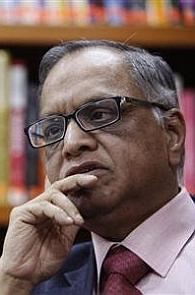 | « Back to article | Print this article |
N R Narayana Murthy’s return to Infosys comes at a time when the morale of the company’s management is at an all-time low. Despite efforts to return to the growth path, the company hasn’t been able to do so, disappointing the market, as well as investors. It is losing market share and profitability. It has also lost control over business predictability, something it was best known for.
It is losing market share and profitability. It has also lost control over business predictability, something it was best known for.
According to a recent report by analyst firm Gartner, last year, Infosys’s growth was the slowest among most offshore-centric IT services companies that had a similar model.
The company recorded mere 6.6 per cent growth in 2012, lower than Bangalore-based Wipro (7.6 per cent growth). In comparison, Cognizant reported revenue growth of 20.1 per cent, HCL Technologies 18.1 per cent and TCS 15.2 per cent.
While Infosys managed to retain global market share at 0.7 per cent in 2012, both TCS and Cognizant improved market shares by a percentage point each to 1.2 and 0.8 per cent, respectively.
In the last two years, the company disappointed many a times. In the quarter ended March, its operating margin stood at 23.5, 300 basis points lower than that of TCS.
The company’s slide, however, wasn’t sudden; it unfolded through the last two to three years.
Industry observers believe much of the company’s current condition can be attributed to the timing of the leadership change and the internal restructuring after the retirement of Narayana Murthy. Many also feel the company failed to identify the changes in the market place ahead of time, and adapt to those.
This is said to be the reason why despite having all positives for driving the company in the changed business environment, the Infosys 3.0 strategy hasn’t